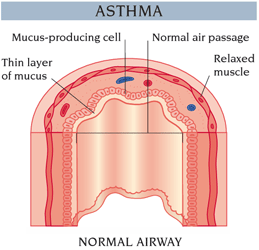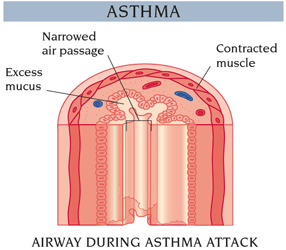AsthmaLong-term lung disease
|
Basic Information
What is Asthma?
 Asthma is a lung condition characterized by episodes of obstructed breathing. They occur due to narrowing of the breathing passages, making it difficult to inhale but even more difficult to exhale. The narrowing can be caused by inflammation in the airways, by spasm of the muscles in the airways (bronchospasm), or both.
Asthma is a lung condition characterized by episodes of obstructed breathing. They occur due to narrowing of the breathing passages, making it difficult to inhale but even more difficult to exhale. The narrowing can be caused by inflammation in the airways, by spasm of the muscles in the airways (bronchospasm), or both.
Asthma can be acute or chronic. With acute asthma, the airways are relatively normal between attacks. In chronic asthma there is some narrowing of the airways continuously, with further narrowing during an acute attack. Asthmatic episodes are experienced as tightness in the chest, difficulty exhaling, wheezing, and coughing. An asthma attack can last minutes or days, and can range from mild to life threatening. The unpredictability of these episodes can make them extremely frightening for the individual and the family. Between attacks, the individual's lung function may be entirely normal. Precipitating factors for an attack can be viral respiratory infections, allergy, smoke or air pollution, a drug such as aspirin or beta-blockers, a specific food or food additive such as sulfites), physical exertion especially in cold air, and emotional stress. Occupational asthma can be seen when the causative agent is found in the work place, perhaps from dusts, molds, chemical fumes, metals, or exposure to animals or their dander.
Approximately five percent of the US population has asthma, and the incidence appears to be rising in the industrialized world. Susceptibility to asthma appears to be an inherited trait. Most cases begin before the age of 25, but asthma can begin at any age. Being born prematurely increases the risk of developing asthma later.
Asthma signs and symptoms

- Chest tightness and shortness of breath.
- Wheezing upon breathing out.
- Coughing, especially at night, occasionally with thick, clear or yellow sputum.
- Rapid, shallow breathing that is easier with sitting up.
- Breathing difficulty.
- Neck muscles tighten.
Severe symptoms of acute attack:
- Bluish skin.
- Exhaustion.
- Grunting respiration.
- Inability to speak.
- Mental changes, including restlessness or confusion.
Causes
Inflammation and resulting spasm of air passages (bronchi and bronchioles), followed by swelling of the passages and thickening of lung secretions (sputum). This decreases or closes off air to the lungs. These changes are caused by:
- Allergens, such as pollen, dust, animal dander, molds and some foods.
- Lung infections such as bronchitis.
- Air irritants, such as smoke and odors.
- Exposure to occupational chemicals or other materials.
Risk increases with
- Other allergic conditions, such as eczema or hay fever.
- Family history of asthma or allergies.
- Exposure to air pollutants.
- Smoking.
- Use of some drugs such as aspirin.
- Stresses (viral infection, exercise, emotional upset, noxious odors and tobacco smoke).
Preventive measures
- Avoid known allergens and air pollutants.
- Take prescribed preventive medicines regularly; don't omit them when you feel well.
- Avoid aspirin.
- Investigate and avoid triggering factors.
- Do relaxation and airway clearing exercises.
Expected outcomes
A pneumothorax or pneumomediastinum can occur with severe asthma attacks, especially if the individual requires mechanical ventilation. In a severe asthma attack that is unresponsive to treatment, a state of prolonged bronchospasm called status asthmaticus can result; this may be followed by respiratory failure and death. Individuals with chronic pulmonary disease in addition to asthma will often have more severe and debilitating episodes of asthma. Asthmatics being treated with long-term steroids can have the complications of blood chemistry disturbances, cataracts, immunosuppression, and adrenal suppression. Cardiac arrhythmia may be precipitated by over-treatment for asthma.
Possible complications
The outcome in asthma is quite variable. Nearly twenty percent of people with asthma have some limitation in their daily life due to the disease. A mild asthmatic attack may be treated easily with an extra dose of inhaled bronchodilator. A severe asthmatic attack developing over weeks might lead to status asthmaticus, hospitalization, and multiple complications. If the individual's airways remain chronically inflamed, chronic bronchitis can result, leading to permanent disability.
Asthma treatment
General measures
- Diagnostic tests may include laboratory blood studies, pulmonary-function tests and allergy testing, usually with skin tests.
- Emergency-room care and hospitalization for severe attacks.
- Psychotherapy or counseling, if asthma is stress-related.
- Eliminate allergens and irritants at home and at work, if possible. Treatment for desensitizing to specific allergens.
- Keep regular medications with you at all times.
- Sit upright during attacks.
- Stay indoors as much as possible during high allergen times.
Medications
- Leukotriene Receptor Antagonists
- Asthma Medications
- Expectorants to loosen sputum.
- Bronchodilators to open air passages.
- Intravenous cortisone drugs (emergencies only) to decrease the body's allergic response.
- Cortisone drugs by nebulizer, which have fewer adverse reactions than oral forms.
- Antihistamines (cromolyn sodium or nedocromil) by nebulizer. These are preventive drugs.
| Information | Brand | Generic | Label | Rating |
 |
Lasix | Furosemide |  |
|
 |
Singulair | Montelukast |  |
|
 |
Deltasone | Prednisone |  |
Zyrtec (Cetirizine),
Proventil (Albuterol),
Decadron (Dexamethasone),
Medrol (Methylprednisolone),
Flonase (Fluticasone inhalation),
Atrovent (Ipratropium bromide)
Acute asthma is treated with an inhaled bronchodilator and oxygen. Intravenous muscle relaxants and steroids may also be needed. If the attack is severe and prolonged, the individual is admitted to the hospital for intensive treatment, as respiratory failure can be a possible development. Treatment might require a positive-pressure oxygen mask or a mechanical ventilator.
Treatment of chronic asthma includes inhaled bronchodilators, as well as decreasing the exposure to causative agents. In persons with more frequent and/or severe attacks, use of inhaled steroids, mast cell stabilizers, muscle relaxants, and oral steroids may be prescribed long-term. Aggressive treatment of pulmonary infections is recommended, along with immunization against influenza and pneumococcal pneumonia.
Alternatives
Other causes of wheezing or abnormal sounds with breathing are left heart failure, inhalation of a foreign body, acute or chronic bronchitis, acute bronchiolitis, narrowing of the trachea by an enlarged thyroid gland, vocal cord dysfunction, bronchial stenosis, cystic fibrosis, pulmonary embolus, sarcoidosis, panic disorder, pneumothorax, and inhalation of stomach acid.
Activity
- Stay active, but avoid sudden bursts of exercise. If an attack follows heavy exercise, sit and rest. Sip warm water.
- Treatment with bronchodilators often prevents exercisecaused asthma.
- Swimming is perhaps the best exercise for asthma patients.
Diet
- No special diet, but avoid foods to which you are sensitive.
- Drink at least 3 quarts of liquid daily to keep secretions loose.
Appropriate specialists
Pulmonologist and allergist.
Notify your physician if
- You or a family member has symptoms of asthma.
- You have an asthma attack that doesn't respond to treatment. This is an emergency!
- New, unexplained symptoms develop. Drugs used in treatment may produce side effects.
Last updated 27 May 2015
